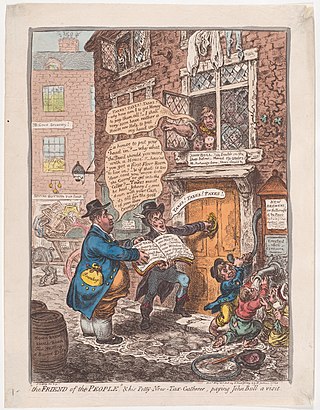Related Research Articles
In many states with political systems derived from the Westminster system, a consolidated fund or consolidated revenue fund is the main bank account of the government. General taxation is taxation paid into the consolidated fund, and general spending is paid out of the consolidated fund.

The Australian Electoral Commission (AEC) is the independent statutory authority and agency of the Australian Government responsible for the management of federal Australian elections, by-elections and referendums.

The Act to Provide a Naval Armament, also known as the Naval Act of 1794, or simply, the Naval Act, was passed by the 3rd United States Congress on March 27, 1794, and signed into law by President George Washington. The act authorized the construction of six frigates at a total cost of $688,888.82. These ships were the first ships of what eventually became the present-day United States Navy.
The Constitution Alteration (Finance) Bill 1909, was an unsuccessful Australian referendum which sought to alter the Australian Constitution to amend section 87 which was due to lapse in 1910. It was to add to the Constitution a financial agreement reached between the States and the Commonwealth to replace the section.
Pensions in the United Kingdom, whereby United Kingdom tax payers have some of their wages deducted to save for retirement, can be categorised into three major divisions - state, occupational and personal pensions.
The Australian Law Reform Commission is an Australian independent statutory body established to conduct reviews into the law of Australia. The reviews, also called inquiries or references, are referred to the ALRC by the Attorney-General for Australia. Based on its research and consultations throughout an inquiry, the ALRC makes recommendations to government so that government can make informed decisions about law reform.
Income taxes are the most significant form of taxation in Australia, and collected by the federal government through the Australian Taxation Office. Australian GST revenue is collected by the Federal government, and then paid to the states under a distribution formula determined by the Commonwealth Grants Commission.

The Shire of Christmas Island is a local government area encompassing the Australian external territory of Christmas Island. Under the Christmas Island Act, Western Australian laws apply to the island, including the Local Government Act 1995.

The Convention Parliament of England followed the Long Parliament that had finally voted for its own dissolution on 16 March that year. Elected as a "free parliament", i.e. with no oath of allegiance to the Commonwealth or to the monarchy, it was predominantly Royalist in its membership. It assembled for the first time on 25 April 1660.

The history of taxation in the United Kingdom includes the history of all collections by governments under law, in money or in kind, including collections by monarchs and lesser feudal lords, levied on persons or property subject to the government, with the primary purpose of raising revenue.
Section 81 of the Constitution of Australia creates a "consolidated revenue fund", money collected by the Commonwealth through taxation and other levies. The way this money may be collected is regulated by Section 51 of the Constitution. Notable legal decisions decided by the High Court of Australia about section 81 include "the Pharmaceutical Benefits case"
Section 3 of the Constitution of Australia deals with the salary of Governor General. The salary of Governor-General is paid from the Consolidated Revenue Fund and is regulated by the Constitution, which fixed the initial salary at £10,000, an amount that would not increase until 1974.
The Potato Marketing Corporation of Western Australia (PMC) was a statutory corporation created by the Government of Western Australia's Marketing of Potatoes Act 1946. It was charged with managing the supply of fresh table potatoes in Western Australia. The statutory corporation operated to ensure licensed growers supplied potatoes all year round to the WA consumer market. The corporation was self-funded by revenue from licence fees and did not receive financial support from the state government. The agency dictated the varieties and volume in the WA potato market.
References
- 1 2 3 "Commonwealth of Australia Numbered Acts". www8.austlii.edu.au. Retrieved 22 February 2024.